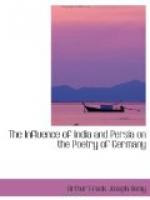CHAPTER I.
INTRODUCTION.
Information of
Mediaeval Europe Concerning India and
Persia—Travellers—India
and Persia in Mediaeval German
Poetry.
The knowledge which mediaeval Europe had of India and Persia was mostly indirect, and, as might be expected, deficient both in correctness and extent, resting, as it did, on the statements of classical and patristic writers, on hearsay and on oral communication. In the accounts of the classic writers, especially in those of Pliny, Strabo, Ptolemy, truth and fiction were already strangely blended. Still more was this the case with such compilers and encyclopaedists as Solinus, Cassiodorus and Isidorus of Sevilla, on whom the mediaeval scholar depended largely for information. All these writers, in so far as they speak of India, deal almost entirely with its physical description, its cities and rivers, its wealth of precious stones and metals, its spices and silks, and in particular its marvels and wonders. Of its religion we hear but little, and as to its literature we have only a few vague statements of Arrian,[1] Aelian[2] and Dio Chrysostomus.[3] When the last mentioned author tells us that the ancient Hindus sang in their own language the poems of Homer, it shows that he had no idea of the fact that the great Sanskrit epics, to which the passage undoubtedly alludes, were independent poems. To him they appeared to be nothing more than versions of Homer. Aelian makes a similar statement, but cautiously adds [Greek]. Philostratus represents the Hindu sage Iarchas as well acquainted with the Homeric poems, but nowhere does his hero Apollonius of Tyana show the slightest knowledge of Sanskrit literature.[4]
Nor do the classic authors give us any more information about the literature of Persia, though the Iranian religion received some attention. Aristotle and Theopompus were more or less familiar with Zoroastrian tenets,[5] and allusions to the prophet of ancient Iran are not infrequent in classic writers. But their information concerning him is very scanty and inaccurate. To them Zoroaster is simply the great Magian, more renowned for his magic art than for his religious system. Of the national Iranian legends, glimpses of which we catch in the Avesta (esp. Yt. 19), and which must have existed long before the Sassanian period and the time of Firdausi, the Greek and Roman authors have recorded nothing.
* * * * *
But Europe was not limited to the classic and patristic writers for information about the Orient. The points of contact between the Eastern and Western world were numerous even before the Portuguese showed the way to India. Alexandria was the seat of a lively commerce between the Roman Empire and India during the first six centuries of the Christian era; the Byzantine Empire was always in close relations, hostile or friendly, with Persia; the Arabs had settled




